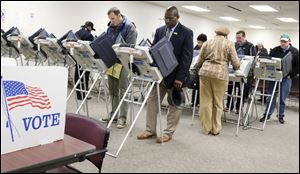
U.S. Supreme Court declines to restore week of early voting in Ohio
A lower court decision last month upheld a law eliminating days in which people could register and vote at the same time.
9/13/2016COLUMBUS — Early voting will begin in Ohio on Oct. 12 after the U.S. Supreme Court today rejected a Democratic attempt to restore the so-called Golden Week during which Ohioans could simultaneously register and cast a ballot.
In a one-sentence order, the high court refused to stay a decision issued last month by the Cincinnati-based U.S. 6th Circuit Court of Appeals that upheld a 2013 law that narrowed Ohio’s early voting window.

Voters cast ballots on March 11, two days before the primary.
The appeals court did not accept the Ohio Democratic Party’s contention that the move was passed by Republicans to disproportionately affect minority, college student, and lower-income voters who were more likely to take advantage of Golden Week and were more likely to vote Democratic.
This marked the second time that the U.S. Supreme Court had weighed in on the issue. It stepped in to prevent a last-minute change in the voting schedule prior to the 2014 gubernatorial election after a lower court ruling would have restored Golden Week. But the court had not ruled at the time on the merits of the issue at that time and did not explain its reasoning for rejecting a stay this time.
After long lines at polling places were experienced during the 2004 election, Ohio lawmakers created no-fault absentee voting to ease some of the pressure on Election Day. Lawmakers were also seeking to undercut a package of election reforms on the ballot that year, the most popular of which, according to polls at the time, was absentee voting.
In the end, the entire package of reforms was rejected by voters.
The law opened the window for early voting 35 days before the election, but the deadline to register to vote was 30 days before the election. That created what was later dubbed Golden Week. During those days, someone could walk into a board of elections, register to vote, and immediately cast an absentee ballot that would be counted on Election Day once the voter’s eligibility checked out.
Senate Bill 238, passed three years ago, reduced the early voting window from 35 days to 29, opening the day after the registration deadline.
“Many reasons supported the change,” reads the state’s brief filed with the Supreme Court on behalf of Secretary of State Jon Husted. ”Boards have many time-sensitive duties at this time. They are processing registrations, completing registration rolls, finalizing ballots, testing voting machines, and processing absentee applications.
“Same-day registration and voting also required boards to hire temporary staff or have staff work overtime,” the brief reads. “And officials viewed this time as increasing fraud potential.”
U.S. Rep. Tim Ryan, a Youngstown Democrat who has been mentioned as a potential gubernatorial candidate in 2018, voiced disappointment in the ruling.
“We know early voting and the Golden Week increases voter turnout and gives more citizens a chance to have their voices heard,” Mr. Ryan said. “Over the last two presidential elections alone, tens of thousands of Ohioans have counted on the Golden Week to register to vote and cast their ballots.
“Voting in elections is one of our country's most sacred freedoms, and we should do everything in our power to make it easier, not more difficult,” he said.